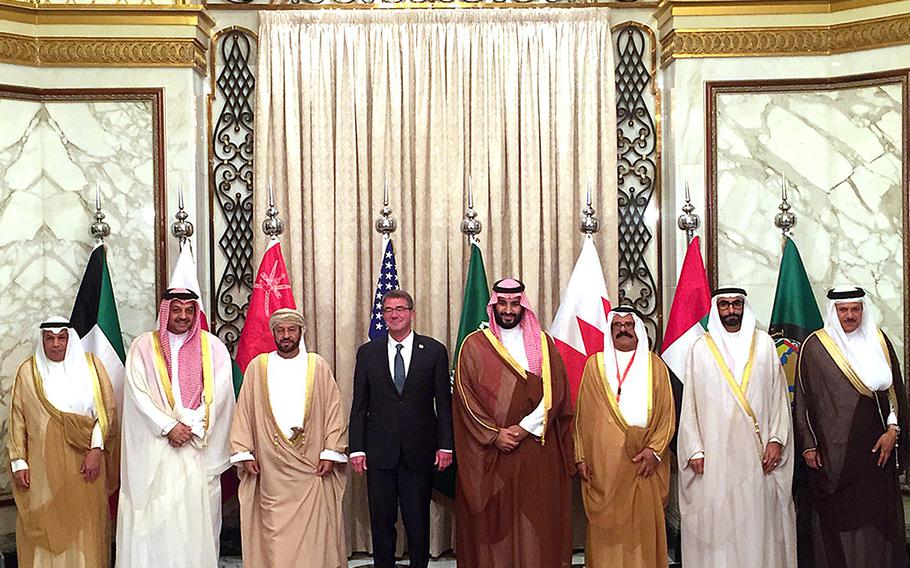
Secretary of Defense Ash Carter stands for a photo with his defense minister counterparts at the Gulf Cooperation Council in Riyadh, Saudi Arabia, on Wednesday, April 20, 2016. (Tara Copp/Stars and Stripes )
RIYADH, Saudi Arabia — Secretary of Defense Ash Carter met Wednesday with the defense ministers of Saudi Arabia and other Gulf Cooperation Council countries to discuss what additional support the Arab nations could provide in the war against the Islamic State group.
Carter has pushed Saudi Arabia and the council's other Sunni Arab members, including Bahrain, Qatar, Kuwait, the United Arab Emirates and Oman, to contribute more to the fight against Islamic State militants in Iraq.
The countries have been reluctant to give aid to Iraq's Shia-dominated government, which under former Iraqi Prime Minister Nouri al-Maliki largely excluded Sunnis from military and government roles. Haider al-Abadi, Iraq's prime minister now, has pushed for more inclusion of Sunnis as he struggles to stabilize Iraq's government and fight the Islamic State group.
The GCC defense ministers focused on six areas of cooperation that were established at a Camp David summit last year. Some of the areas targeted enhancing the region's defenses against Iran, including maritime security, cooperation in ballistic missile defense and more joint exercises.
At Wednesday’s meeting, the GCC ministers did not offer additional commitments of military or economic support for Iraq, a reflection that the country’s continued instability is affecting the Gulf states' willingness to contribute, a senior U.S. official who spoke on the condition of anonymity told reporters traveling with Carter.
"There's a chicken and egg situation. They want the politics of Baghdad to be worked out, then they are ready to do more," the senior U.S. official said. "We say, do more, to help the politics to work out. It's a difference of approach."
Carter said if the Gulf states are reluctant to provide direct support to the Iraqi government, they could increase their efforts to support Iraqi nonprofits and non-governmental agencies to get aid directly to people there.
"The Gulf states are making contributions now," he said. "What we would like, and what we discussed today is that we would like them to do more. Even as we are doing more. If we all do more, we can hasten the defeat of [the Islamic State group]."
Abdullatif bin Rashid Al Zayani, general secretary of the Gulf Cooperation Council, said the Gulf states would focus on reconstruction and investment in Iraq after the Islamic State group is defeated.
"We need to be planning for and preparing for the day after peace is achieved," he said.
The meeting Wednesday followed an announcement earlier this week that the United States would send another 217 troops to Iraq and advanced weapons, including Apache attack helicopters and High Mobility Artillery Rocket Systems. The additional forces bring the number of U.S. troops on the ground in Iraq to at least 4,087. The additional weapons help with long-range attacks and support 5,000 troops from the Iraqi army's 15th Division, as it clears villages to the south of Islamic State-controlled Mosul in preparation to retake the city.
President Barack Obama arrived in Riyadh on Wednesday to press the Gulf states at Thursday's summit to provide additional aid to fight the Islamic State group. He told CBS News that the added forces and pressure would lead to the Islamic State group's defeat in Mosul by the end of 2016.
"My expectation is that by the end of the year, we will have created the conditions whereby Mosul will eventually fall," Obama said.
copp.tara@stripes.com Twitter: @TaraCopp